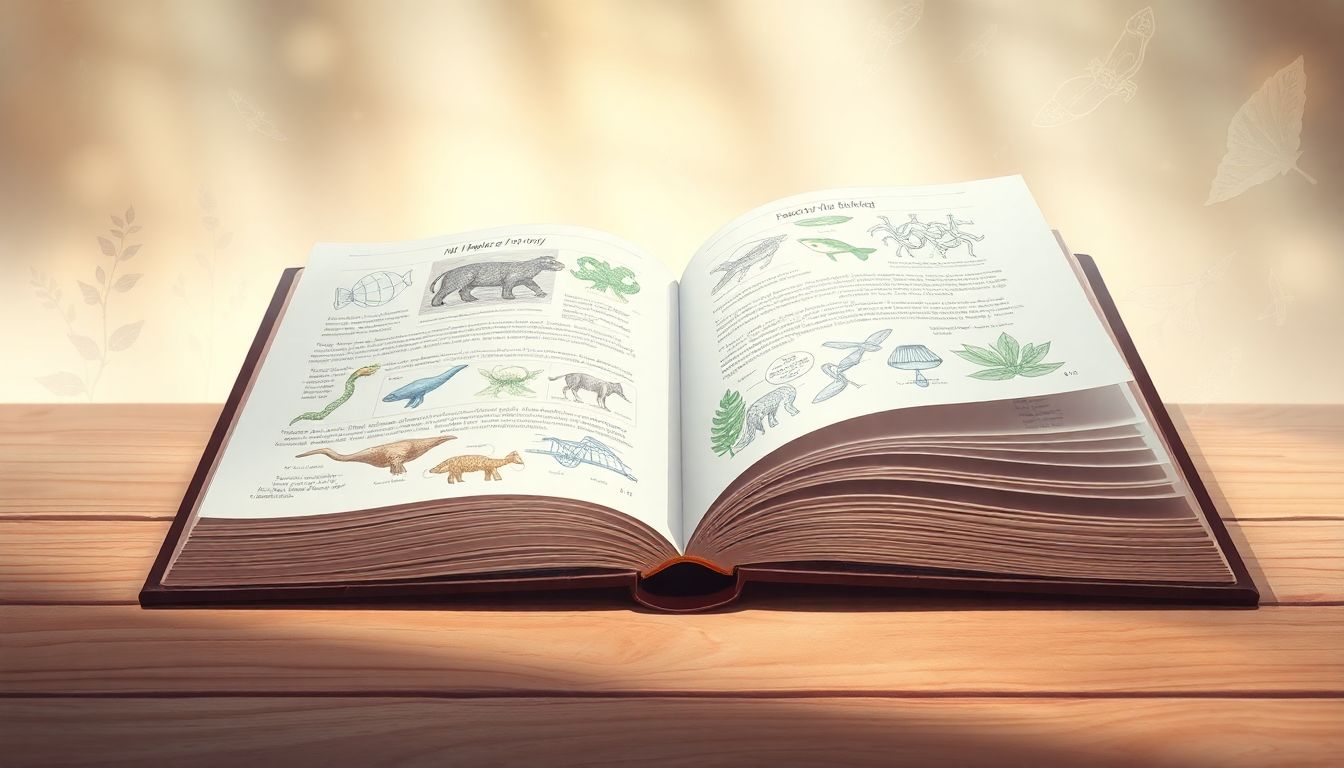Are you feeling stuck on what to research in the fascinating field of biology? It’s totally normal to hit a wall when brainstorming ideas. With so many areas to explore, figuring out a direction can feel overwhelming.
But don’t worry! By sticking around, you’ll discover a treasure trove of ChatGPT prompts designed to spark your creativity and guide you toward captivating research topics that will set your curiosity ablaze.
From animal behavior to genetics, we’ll dive into various biology domains and help you refine your ideas. Let’s unleash that inner scientist together!
Key Takeaways
- Use ChatGPT prompts to generate innovative biology research ideas easily.
- Explore key areas of biology like ecology, molecular biology, botany, and zoology for tailored research questions.
- Study animal behavior through experiments on social interactions, communication, and habitat changes.
- Investigate plant biology, focusing on photosynthesis, pollination, and the effects of climate and soil on growth.
- Delve into microbiology by examining gut health, antibiotic resistance, and microbial diversity in various environments.
- Address environmental biology challenges by researching pollution, deforestation, and conservation strategies.
- Conduct ecological studies to assess ecosystem health, species interactions, and the impact of invasive species.
- Explore genetics and evolution through studies on heredity, adaptations, and genetic variation in populations.

ChatGPT Prompts for Generating Biology Field Research Ideas
Generating innovative research ideas in biology is easier than ever with the help of AI tools like ChatGPT.
Whether you’re a student, a researcher, or just curious about biology, using specific prompts can help brainstorm exciting project ideas.
Here are some effective prompts you can copy and paste into ChatGPT:
- “Generate ten innovative ideas for field research in the climate change impacts on coral reefs.”
- “List 5 potential experiments to study the effects of urbanization on bird migration patterns.”
- “Provide suggestions for interdisciplinary research projects that combine genetics and ecology.”
- “What are some unexplored areas in plant biology that could yield interesting research results?”
- “Suggest research topics that focus on the microbial life in extreme environments, like hydrothermal vents.”
These prompts can serve as a great starting point to spark your creativity and guide your research journey.
Understanding Different Areas of Biology for Research
Biology is a diverse field with numerous branches that cater to various research interests.
From ecology to genetics, understanding the vast areas of biology can help you pinpoint where to focus your research efforts.
Here are some major areas of biology to consider:
- Molecular Biology: This area studies the molecular mechanisms that underpin biological processes.
- Ecology: Focuses on the relationships between organisms and their environment, including ecosystems and biodiversity.
- Botany: The study of plants, including their physiology, structure, and interactions with the environment.
- Zoology: Concentrates on animal biology, behavior, and interactions.
Explore these fields deeply to generate tailored research questions that align with your interests and the pressing issues in biology.
Prompts for Animal Behavior Studies
Animal behavior is a captivating area that offers endless possibilities for research projects.
Understanding how animals interact with each other and their environment can lead to major insights in ecology and conservation.
Here are some ChatGPT prompts tailored for studying animal behavior:
- “Suggest various methods to study social behaviors in primates.”
- “What experimental designs can be used to assess communication among dolphin populations?”
- “Investigate the impact of habitat changes on migratory patterns in birds.”
- “List five behavioral traits that can be influenced by environmental stressors in urban wildlife.”
- “What innovative approaches can we take to monitor animal behavior in their natural habitat?”
These prompts can guide your research planning and help frame your experimental approaches in the fascinating world of animal behavior.
Prompts for Plant Biology Research
Plant biology is an essential field for understanding life on Earth, from agriculture to conservation.
Investigating plant processes, relationships, and adaptations presents numerous research opportunities.
Here are some useful prompts for exploring plant biology:
- “Explore the influence of light conditions on photosynthesis in different plant species.”
- “Identify factors that affect plant-pollinator interactions in urban environments.”
- “Research the genetic basis for drought resistance in plants.”
- “What are the effects of soil composition on plant growth and development?”
- “Investigate the adaptive traits of native plants in a changing climate.”
Using these prompts can give you a structured approach to generate insightful research questions in plant biology.

Prompts for Microbiology Investigations
Microbiology is a fascinating field that explores the hidden world of microorganisms.
Research in this area can lead to discoveries that improve health, agriculture, and environmental outcomes.
Here are some prompts you can use to dive into microbiology research:
- “Identify the role of gut microbiota in influencing human health.”
- “List potential experiments to study the effects of antibiotics on bacterial resistance.”
- “Explore how different environmental factors affect microbial diversity in soil.”
- “Research the impact of microbial processes on bioremediation of polluted environments.”
- “Examine microbial interactions in a specific ecosystem, like a freshwater pond.”
Utilizing these prompts will help you frame your investigations in the captivating realm of microorganisms.
Prompts for Environmental Biology Projects
Environmental biology focuses on understanding the relationships between organisms and their environments.
This branch of biology is essential in addressing issues like conservation and climate change.
Here are some valuable prompts for environmental biology research:
- “Assess the impact of plastic pollution on marine life.”
- “Research the effects of deforestation on local wildlife populations.”
- “Examine the role of wetlands in carbon sequestration.”
- “Investigate how climate change is altering migratory patterns of birds.”
- “Identify conservation strategies for endangered species in urban settings.”
These prompts can help steer your research towards significant environmental challenges we face today.
Prompts for Ecological Field Studies
Ecological field studies provide insights into the complex interactions within ecosystems.
These investigations are crucial for understanding biodiversity and ecosystem health.
Here are some strong prompts for conducting ecological field research:
- “Design a study to monitor the health of a specific ecosystem over time.”
- “Analyze species interactions by studying predator-prey relationships in local habitats.”
- “Investigate the effects of invasive species on native biodiversity.”
- “Explore the importance of keystone species in maintaining ecosystem balance.”
- “Research how seasonal changes affect species composition in a given area.”
These prompts can drive your fieldwork and help you make meaningful contributions to the field of ecology.
Prompts for Genetics and Evolution Research
The fields of genetics and evolution explore the mechanisms of heredity and the processes that drive speciation.
Research in these areas is vital to understanding the diversity of life on Earth.
Here are some prompts to kickstart your research in genetics and evolution:
- “Investigate the genetic basis of a specific trait in a model organism.”
- “Research how environmental pressures influence evolutionary adaptations.”
- “Examine patterns of genetic variation in populations of a given species.”
- “Explore the role of mutation in the evolution of antibiotic resistance in bacteria.”
- “Analyze the impact of genetic drift on small populations over time.”
Using these prompts, you can develop insightful studies that contribute to our understanding of genetics and evolutionary processes.

Tips for Using ChatGPT to Refine Research Ideas
Using ChatGPT effectively can significantly enhance your research idea generation process.
Start by crafting specific prompts that target the area of biology you’re interested in.
For example, instead of asking for general research ideas, specify the focus: “Suggest experimental designs to study the impact of invasive species on local ecosystems.”
Don’t hesitate to iterate on your prompts to refine the outputs further.
When you get a response, think critically about it and ask follow-up questions for deeper insights.
Here are some additional prompts to help you get started:
- “Provide feedback on the feasibility of studying urban wildlife adaptations in my city.”
- “Suggest ways to combine microscopy and field studies in my research on soil microorganisms.”
- “What ethical considerations should I keep in mind while researching animal behavior?”
- “List tools and technologies that can aid my research in plant biology.”
- “Help me brainstorm collaborative research ideas that include elements of environmental science.”
Utilize these strategies to make your research planning more efficient and targeted.
Frequently Asked Questions About Biology Field Research Prompts
Many people have questions when it comes to using prompts for biology research.
Understanding these can help you navigate your research more effectively.
Here are some common FAQs along with their answers:
- What are the best biology research ideas?
Focus on current issues and gaps in scientific literature; use prompts to explore under-researched territories. - How can I use ChatGPT for biology prompts?
Start by identifying a specific topic, then use tailored prompts to yield focused research ideas. - What challenges might I face in field research?
Potential obstacles include funding, accessibility to research sites, and ethical considerations. - How can I improve my research questions with prompts?
Be specific and concise; refine your questions based on the responses you get and iterate as necessary. - Is collaborating with others beneficial for research?
Yes, collaboration can bring diverse perspectives and expertise, enriching your research quality.
These insights can guide you in maximizing your research outcomes in biology.
FAQs
Consider using ChatGPT prompts tailored to specific biology fields. Explore key concepts and current trends in areas like animal behavior, plant biology, and microbiology to generate focused research questions and innovative project ideas.
To refine your research ideas, present specific prompts related to your interests. Seek feedback on clarity and direction, and ask for suggestions on methodologies or additional literature to explore, enhancing the overall quality of your ideas.
You can explore various fields like animal behavior, plant biology, microbiology, environmental biology, and genetics. Each area has unique prompts to inspire detailed and innovative research projects tailored to current scientific inquiries.
ChatGPT prompts can help identify specific ecological questions, develop hypotheses, and design methodologies for field studies. This enables researchers to focus on pressing environmental issues while also inspiring novel approaches and collaborative opportunities.
